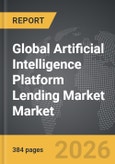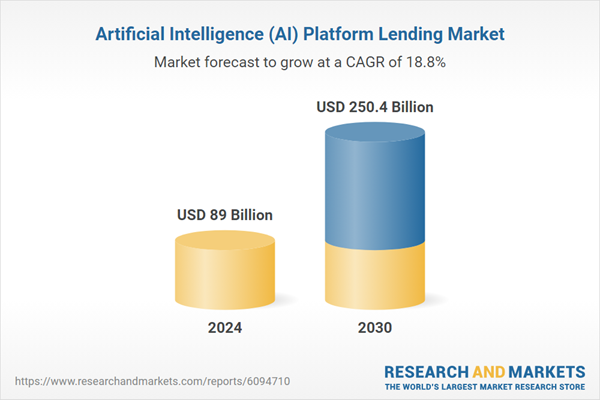Global Artificial Intelligence (AI) Platform Lending Market - Key Trends & Drivers Summarized
Is AI Disrupting Traditional Lending Models with Data-Driven Precision?
Artificial Intelligence (AI) is transforming platform lending by dismantling the inefficiencies and rigid processes of traditional credit evaluation and decision-making models. In contrast to conventional banks that often rely on limited credit history, rigid scoring systems, and time-consuming paperwork, AI-driven lending platforms use a broad array of alternative data - such as mobile usage, social media behavior, transaction history, utility bills, and even browsing patterns - to assess borrower risk with far greater nuance. These systems employ machine learning algorithms that continuously evolve by analyzing vast datasets in real time, allowing them to identify subtle correlations and behavioral signals that conventional models overlook. Natural language processing (NLP) and sentiment analysis are also being used to evaluate application language or financial documents for deeper risk assessment. As a result, AI enables faster underwriting, more inclusive credit access, and significantly lower default rates. In emerging markets, where formal credit histories are sparse, AI-powered lending opens up opportunities for millions of unbanked and underbanked individuals to access capital. The speed and scalability of these platforms are equally disruptive - loan approvals can now be delivered in minutes rather than days, supporting a 24/7 financial ecosystem. Furthermore, AI optimizes interest rates and loan terms in real time, ensuring fairness while maximizing lender returns. These advancements are not just improving operational efficiency; they are redefining the very foundations of lending by making it data-rich, predictive, and fundamentally more accessible.How Is Consumer Behavior and Fintech Convergence Driving AI Lending Adoption?
The changing expectations of digital-first consumers and the rapid convergence of fintech and big data are accelerating the global adoption of AI platform lending. Modern borrowers - especially millennials and Gen Z - prioritize convenience, speed, and personalization in their financial interactions, and AI-powered lending platforms are uniquely equipped to deliver on these demands. Whether applying for a microloan, auto financing, or peer-to-peer (P2P) credit, users now expect a seamless, app-based experience with real-time updates and minimal human intervention. AI enables this by automating every stage of the lending process, from identity verification and credit scoring to risk assessment and collections. Furthermore, fintech companies are using AI to create financial profiles that evolve with the borrower, adjusting loan offers based on income fluctuations, payment history, and spending patterns. These dynamic capabilities are particularly appealing to gig workers and freelancers, whose incomes may be irregular and not easily assessed by traditional models. The synergy between AI and open banking initiatives is also expanding the reach of platform lenders, as consumers willingly share financial data in exchange for better loan terms and tailored offers. Additionally, social and behavioral data - previously untapped by lenders - is now being factored into lending decisions, creating a more holistic understanding of creditworthiness. AI also plays a critical role in fraud detection, identifying anomalies in user behavior and flagging high-risk transactions before they escalate. This blend of consumer-centric design and fintech innovation is positioning AI platform lending as a flexible, responsive, and highly scalable alternative to traditional financial institutions.Is AI Enhancing Risk Management and Regulatory Compliance in Lending Ecosystems?
In a lending environment increasingly defined by complex risk profiles and evolving regulatory landscapes, AI is emerging as a crucial enabler of smarter risk management and compliance assurance. Traditional risk assessment models are often static, using backward-looking data and rigid formulas that fail to capture real-time borrower dynamics or market fluctuations. In contrast, AI systems process multi-dimensional data in real time, allowing for continuous risk scoring and adaptive lending strategies. Machine learning models can identify early signs of borrower distress - such as changes in transaction patterns or reduced account activity - and trigger preemptive measures like payment plan adjustments or early interventions. This proactive approach not only reduces defaults but also supports responsible lending practices. AI is also instrumental in meeting compliance obligations, with natural language processing and rule-based engines automatically scanning documentation and loan terms for adherence to regulatory standards. In regions with strict financial oversight, such as the EU or U.S., AI can be used to generate compliance reports, perform Know Your Customer (KYC) checks, and ensure anti-money laundering (AML) protocols are followed meticulously. Explainable AI (XAI) is gaining traction as a solution to regulatory transparency demands, offering clear justifications for lending decisions - a critical requirement for maintaining trust and accountability in automated systems. These tools allow regulators and auditors to understand the rationale behind credit decisions, mitigating the legal and reputational risks associated with black-box algorithms. As financial systems become more data-driven and real-time, AI's ability to manage complex, high-stakes decision-making processes with speed and accuracy is proving indispensable to the future of compliant and resilient lending ecosystems.What Are the Core Forces Powering the Global Growth of AI Platform Lending?
The growth in the artificial intelligence (AI) platform lending market is driven by several synergistic forces spanning technological innovation, economic inclusion, policy evolution, and institutional modernization. One of the most significant drivers is the increasing demand for fast, low-friction credit solutions that align with the pace of digital lifestyles and economies. As consumers and businesses alike seek instant access to capital, AI enables lenders to offer personalized loan products at scale without compromising on due diligence. At the same time, the global fintech boom - especially in Asia-Pacific, Latin America, and Africa - is providing a fertile ground for AI lending platforms to flourish, aided by high smartphone penetration, rising internet connectivity, and a growing appetite for financial inclusion. Governments and central banks are also playing a role, introducing data-sharing frameworks like open banking that empower AI models with richer datasets for credit decisioning. Moreover, investor confidence in AI lending startups is driving substantial funding rounds and strategic partnerships, enabling rapid technological advancement and market expansion. On the enterprise side, traditional banks and financial institutions are increasingly collaborating with or acquiring AI-powered lending platforms to modernize their services and compete with agile fintech players. Another key growth factor is the rise of embedded finance, where AI lending capabilities are integrated directly into retail, travel, or e-commerce platforms, allowing consumers to access credit at the point of need. Finally, as cloud computing, edge analytics, and 5G connectivity advance, the infrastructure supporting real-time AI lending is becoming more robust and scalable. These converging trends are creating a global momentum that positions AI platform lending as a cornerstone of the next-generation financial ecosystem.Report Scope
The report analyzes the Artificial Intelligence (AI) Platform Lending market, presented in terms of market value (US$). The analysis covers the key segments and geographic regions outlined below:- Segments: Technology (Natural Language Processing Technology, Deep Learning Technology, Machine Learning Technology, Other Technologies); AI Type (Analytics AI Type, Text AI Type, Visual AI Type, Other AI Types); End-Use (Bank End-Use, Government End-Use, Education End-Use, Other End-Uses).
- Geographic Regions/Countries: World; United States; Canada; Japan; China; Europe (France; Germany; Italy; United Kingdom; Spain; Russia; and Rest of Europe); Asia-Pacific (Australia; India; South Korea; and Rest of Asia-Pacific); Latin America (Argentina; Brazil; Mexico; and Rest of Latin America); Middle East (Iran; Israel; Saudi Arabia; United Arab Emirates; and Rest of Middle East); and Africa.
Key Insights:
- Market Growth: Understand the significant growth trajectory of the Natural Language Processing Technology segment, which is expected to reach US$89.7 Billion by 2030 with a CAGR of a 17.4%. The Deep Learning Technology segment is also set to grow at 17.2% CAGR over the analysis period.
- Regional Analysis: Gain insights into the U.S. market, valued at $24.3 Billion in 2024, and China, forecasted to grow at an impressive 25.2% CAGR to reach $57.7 Billion by 2030. Discover growth trends in other key regions, including Japan, Canada, Germany, and the Asia-Pacific.
Why You Should Buy This Report:
- Detailed Market Analysis: Access a thorough analysis of the Global Artificial Intelligence (AI) Platform Lending Market, covering all major geographic regions and market segments.
- Competitive Insights: Get an overview of the competitive landscape, including the market presence of major players across different geographies.
- Future Trends and Drivers: Understand the key trends and drivers shaping the future of the Global Artificial Intelligence (AI) Platform Lending Market.
- Actionable Insights: Benefit from actionable insights that can help you identify new revenue opportunities and make strategic business decisions.
Key Questions Answered:
- How is the Global Artificial Intelligence (AI) Platform Lending Market expected to evolve by 2030?
- What are the main drivers and restraints affecting the market?
- Which market segments will grow the most over the forecast period?
- How will market shares for different regions and segments change by 2030?
- Who are the leading players in the market, and what are their prospects?
Report Features:
- Comprehensive Market Data: Independent analysis of annual sales and market forecasts in US$ Million from 2023 to 2030.
- In-Depth Regional Analysis: Detailed insights into key markets, including the U.S., China, Japan, Canada, Europe, Asia-Pacific, Latin America, Middle East, and Africa.
- Company Profiles: Coverage of players such as Adobe Inc., Amazon Web Services, Baidu, Inc., Colossyan, DeepDub and more.
- Complimentary Updates: Receive free report updates for one year to keep you informed of the latest market developments.
Some of the 42 companies featured in this Artificial Intelligence (AI) Platform Lending market report include:
- Affirm
- American Express (Kabbage)
- Avant
- Biz2Credit
- DataRobot
- Enova International
- Figure Technologies
- Funding Circle
- Funding Societies
- IBM
- Kinara Capital
- LendingClub
- Microsoft
- OakNorth Bank
- OnDeck Capital
- Overbond
- PayPal Holdings
- SoFi Technologies
- Upstart Holdings
- Zest AI
This edition integrates the latest global trade and economic shifts into comprehensive market analysis. Key updates include:
- Tariff and Trade Impact: Insights into global tariff negotiations across 180+ countries, with analysis of supply chain turbulence, sourcing disruptions, and geographic realignment. Special focus on 2025 as a pivotal year for trade tensions, including updated perspectives on the Trump-era tariffs.
- Adjusted Forecasts and Analytics: Revised global and regional market forecasts through 2030, incorporating tariff effects, economic uncertainty, and structural changes in globalization. Includes historical analysis from 2015 to 2023.
- Strategic Market Dynamics: Evaluation of revised market prospects, regional outlooks, and key economic indicators such as population and urbanization trends.
- Innovation & Technology Trends: Latest developments in product and process innovation, emerging technologies, and key industry drivers shaping the competitive landscape.
- Competitive Intelligence: Updated global market share estimates for 2025, competitive positioning of major players (Strong/Active/Niche/Trivial), and refined focus on leading global brands and core players.
- Expert Insight & Commentary: Strategic analysis from economists, trade experts, and domain specialists to contextualize market shifts and identify emerging opportunities.
Table of Contents
Companies Mentioned (Partial List)
A selection of companies mentioned in this report includes, but is not limited to:
- Affirm
- American Express (Kabbage)
- Avant
- Biz2Credit
- DataRobot
- Enova International
- Figure Technologies
- Funding Circle
- Funding Societies
- IBM
- Kinara Capital
- LendingClub
- Microsoft
- OakNorth Bank
- OnDeck Capital
- Overbond
- PayPal Holdings
- SoFi Technologies
- Upstart Holdings
- Zest AI
Table Information
| Report Attribute | Details |
|---|---|
| No. of Pages | 384 |
| Published | January 2026 |
| Forecast Period | 2024 - 2030 |
| Estimated Market Value ( USD | $ 89 Billion |
| Forecasted Market Value ( USD | $ 250.4 Billion |
| Compound Annual Growth Rate | 18.8% |
| Regions Covered | Global |









